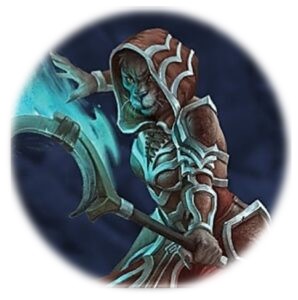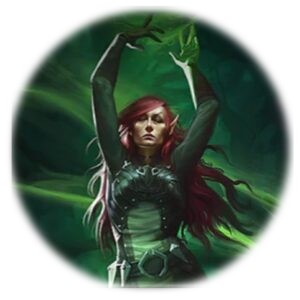 Elder Scrolls is the follow up development of Too Many Bones featuring co-operative outdoor adventures using neoprene mats, chips and plenty of dice. Your heroes are tasked by a guild to undertake a short quest campaign mission over three sessions. An overland map of the chosen region is traversed offering town, peaceful or conflict encounters as you progress, with experience points being earnt and quickly spent to level up your skills and core statistics as you build out your player mat with interesting combinations.
Elder Scrolls is the follow up development of Too Many Bones featuring co-operative outdoor adventures using neoprene mats, chips and plenty of dice. Your heroes are tasked by a guild to undertake a short quest campaign mission over three sessions. An overland map of the chosen region is traversed offering town, peaceful or conflict encounters as you progress, with experience points being earnt and quickly spent to level up your skills and core statistics as you build out your player mat with interesting combinations.
The neoprene tiles are formed by hexagonal spaces which makes the battles more dynamic and strategic than its predecessor. There are three types of battles, a short clash or skirmish, a dungeon delve where you will randomly reveal areas to locate three shards, however here your time is limited and you must keep moving to find what you need before you are overwhelmed. The final session will be a large battle event over multiple tiles and where all your skills and strategy will be tested.
The characters are built entirely to your own choices, unlike Too Many Bones where your mat had preset options to develop. Each hero will have base statistics for health, stamina, magic and combat, but from there you will add special skills or build up the base abilities using experience. Initially you will start with a race type, a combat skill and one special skill, an then each new skill trained comes with its own unique dice which level up, becoming stonger and adding new combinations. Deciding what type of character you will be and what skills you will focus on is varied and fun.
The core box comes with five adventure books, called gazeteers, and each book has its own map to traverse, and quest paths for each guild, so there is a lot of variety to choose from. The mechanics of the game will however be similar each time, traverse the map, have encounters which are often battle related, but with being some more storyline or text related. As you earn experience and improve your character, the enemy count mounts up too, scaling to your current level. You will have twelve days to complete each session chapter which keeps things focused, but a session can itself last a few hours.
Elder Scrolls improves the adventuring side of Too Many Bones, as they have more scenario elements and are more varied, with battles appearing to have more strategic choices. The three types of battles also adds some minor variation to each session, although the time critical delve is dissappointing in reality. Components are comparable, and the game remains really tactile to play. The game offers the feel of both open world and some light dungeon crawling too. The downsides though are the rules take a lot of digesting at first, and although the rulebook is generally good, you will be flipping back and forth a lot.
Despite various adventure improvements, the gearloc characters and battle mats from Too Many Bones do have more charm and player attachment than Elder Scrolls. Also the time to play a one adventure is more manageable. Elder Scrolls as a three part campaign felt it was outstaying its welcome, a little too repetitive and lengthy, and storylines lack real engagement, the final chapter often repeated. It remains a good game, but those i have played with prefer the experience of Too Many Bones more than Elder Scrolls where often games never get fully completed.
…………………………………………………………………………………………………………………………
Expansions
There are expansions you can add to enhance or change the gameplay (my additions highlighted green = own, blue = part owned, red = not purchased) :
Valenwood Expansion
This is the main expansion available featuring a new map, enemies, equipment, and a set of quests, encounters, and delves, two new skill lines and the Arcanist and Burglar classes, and is the most useful addition you can get. Two more main expansion settings are coming next year called Elsweye and Summerset which i am currently unsure i will get.
Component Upgrades
There are a number of entirely optional ways to pimp out your game including premium chips (the most important upgrade for me), neoprene play mats, deluxe bags, dice tray, leather deluxe inventory to hold your saved components, and the blacksmith pack for metal peg upgrades and first player token.
